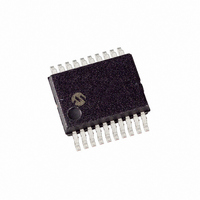PIC18LF13K50T-I/SS Microchip Technology, PIC18LF13K50T-I/SS Datasheet - Page 26

PIC18LF13K50T-I/SS
Manufacturer Part Number
PIC18LF13K50T-I/SS
Description
8 KB Flash, 512 RAM, 15 I/O, 10-bit ADC, USB 2.0, NanoWatt XLP 20 SSOP .209in T/
Manufacturer
Microchip Technology
Series
PIC® XLP™ 18Fr
Datasheets
1.PIC18F13K50-ISS.pdf
(420 pages)
2.PIC18F13K50-ISS.pdf
(40 pages)
3.PIC18F13K50-ISS.pdf
(10 pages)
4.PIC18F13K50-ISS.pdf
(2 pages)
Specifications of PIC18LF13K50T-I/SS
Core Processor
PIC
Core Size
8-Bit
Speed
48MHz
Connectivity
I²C, SPI, UART/USART, USB
Peripherals
Brown-out Detect/Reset, POR, PWM, WDT
Number Of I /o
14
Program Memory Size
8KB (4K x 16)
Program Memory Type
FLASH
Eeprom Size
256 x 8
Ram Size
512 x 8
Voltage - Supply (vcc/vdd)
1.8 V ~ 3.6 V
Data Converters
A/D 11x10b
Oscillator Type
Internal
Operating Temperature
-40°C ~ 85°C
Package / Case
20-SSOP
Processor Series
PIC18LF
Core
PIC
Data Bus Width
8 bit
Data Ram Size
256 B
Interface Type
EUSART, I2C, MSSP, SPI, USB
Maximum Clock Frequency
32 KHz
Number Of Programmable I/os
18
Number Of Timers
4
Operating Supply Voltage
1.8 V to 3.6 V
Maximum Operating Temperature
+ 125 C
Mounting Style
SMD/SMT
3rd Party Development Tools
52715-96, 52716-328, 52717-734, 52712-325, EWPIC18
Development Tools By Supplier
PG164130, DV164035, DV244005, DV164005, DM164127, DV164126
Minimum Operating Temperature
- 40 C
On-chip Adc
10 bit, 12 Channel
Lead Free Status / RoHS Status
Lead free / RoHS Compliant
Lead Free Status / RoHS Status
Lead free / RoHS Compliant
PIC18F1XK50/PIC18LF1XK50
FIGURE 5-4:
FIGURE 5-5:
5.5
A data EEPROM address may be read via a sequence
of core instructions (4-bit command, ‘0000’) and then
output on PGD via the 4-bit command, ‘0010’ (TABLAT
register). The result may then be immediately
compared to the appropriate data in the programmer’s
memory for verification. Refer to Section 5.4 “Read
Data EEPROM Memory” for implementation details of
reading data EEPROM.
DS41342E-page 26
PGC
PGD
Note 1:
PGC
PGD
Verify Data EEPROM
1
0
2
1
Magnification of the High-Impedance delay between PGC and PGD is shown in Figure 5-5.
MSb
3
0
4
0
SHIFT OUT DATA HOLDING REGISTER TIMING DIAGRAM (0010)
HIGH-IMPEDANCE DELAY
P5
PGD = Input
1
1
n
P19
2
P3
3
2
4
n
5
Advance Information
6
7
8
P6
9
LSb
P14
5.6
The term “Blank Check” means to verify that the device
has no programmed memory cells. All memories must
be verified: program Flash, data EEPROM, ID locations
and Configuration bits. The device ID registers
(3FFFFEh:3FFFFFh) should be ignored.
A “blank” or “erased” memory cell will read as a ‘1’.
Therefore, Blank Checking a device merely means to
verify that all bytes read as FFh except the
Configuration bits. Unused (reserved) Configuration
bits will read ‘0’ (programmed). Refer to Table 6-1 for
blank configuration expect data for the various
PIC18F1XK50/PIC18LF1XK50 devices.
Given that Blank Checking is merely code and data
EEPROM verification with FFh expect data, refer to
Section 5.4 “Read Data EEPROM Memory” and
Section 5.2 “Verify Program Flash and ID Locations”
for implementation details.
FIGURE 5-6:
10 11
1
2
PGD = Output
12
Shift Data Out
Blank Check
3
Blank Check Device
13
4
14
device
blank?
Abort
5
Start
Is
15 16
No
6
BLANK CHECK FLOW
2010 Microchip Technology Inc.
MSb
P5A
(Note 1)
(Note 1)
Fetch Next 4-bit Command
Yes
1
n
PGD = Input
2
n
Continue
3
n
4
n











